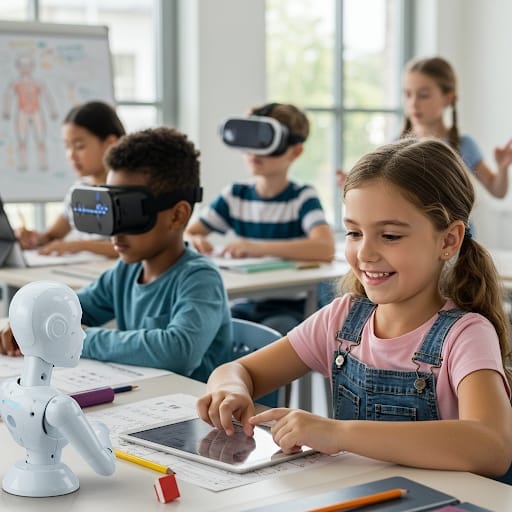The landscape of education is constantly evolving, and at the forefront of this transformation lies artificial intelligence (AI). Once a concept confined to science fiction, AI is rapidly becoming an integral part of how children learn, offering a wealth of benefits that promise to personalize, enhance, and ultimately revolutionize their educational journey. From adaptive learning platforms to intelligent tutoring systems, AI is no longer a futuristic dream but a tangible reality that is reshaping classrooms and empowering young learners in profound ways.
One of the most significant advantages of AI in education is its ability to personalize the learning experience. Gone are the days of a one-size-fits-all approach. AI algorithms can analyze a child’s learning pace, strengths, weaknesses, and preferred learning styles. This data allows AI-powered platforms to tailor content, adjust the difficulty of exercises, and provide targeted feedback precisely when and where a child needs it most. Imagine a math program that recognizes a student struggling with fractions and automatically offers additional practice problems and alternative explanations, or a reading application that suggests books based on a child’s reading level and interests. This level of individualization fosters deeper engagement, boosts confidence, and allows each child to learn at their own optimal pace, ultimately leading to better comprehension and retention.
Furthermore, AI is instrumental in providing instant and personalized feedback. Traditional methods often involve delays in grading and feedback, which can hinder the learning process. AI-powered tools can assess assignments, identify areas of improvement, and offer immediate guidance. This real-time feedback loop allows children to correct mistakes promptly, understand concepts more effectively, and develop a stronger sense of self-awareness as learners. Whether it’s identifying grammatical errors in an essay or pinpointing misunderstandings in a science quiz, AI acts as a tireless and objective learning companion.
Beyond personalization and feedback, AI is also fostering enhanced engagement and motivation. Gamified learning platforms powered by AI can make learning fun and interactive. These platforms often incorporate elements like challenges, rewards, and virtual environments that captivate children’s attention and encourage active participation. By transforming learning into an enjoyable experience, AI can combat boredom and foster a genuine curiosity for knowledge. Imagine learning about history through an interactive virtual reality simulation or mastering a new language through engaging conversational AI tutors.
Moreover, AI is proving to be a valuable tool for supporting educators. AI-powered administrative tools can automate tasks such as grading, scheduling, and generating reports, freeing up teachers’ time to focus on what truly matters: direct interaction with students and the development of engaging lesson plans. AI can also provide teachers with valuable insights into student performance, helping them identify struggling learners early on and tailor their teaching strategies accordingly. This collaborative relationship between AI and educators can lead to more effective teaching and better student outcomes.
AI also opens doors to accessible and inclusive education. For children with learning disabilities or special needs, AI-powered tools can provide personalized support and accommodations. Text-to-speech and speech-to-text technologies can assist students with reading and writing difficulties, while adaptive learning platforms can adjust the learning experience to cater to individual needs. AI can help bridge learning gaps and ensure that all children have the opportunity to reach their full potential.
Looking ahead, the potential of AI in children’s education is immense. We can anticipate even more sophisticated AI-powered tools that will further personalize learning, foster creativity, and develop critical thinking skills. Imagine AI tutors that can engage in nuanced discussions, AI platforms that facilitate collaborative learning projects across geographical boundaries, and AI tools that help children explore complex concepts through interactive simulations.
However, it is crucial to acknowledge the importance of responsible implementation. Ethical considerations, data privacy, and the need to maintain the human element in education must be at the forefront of this technological integration. It is essential to ensure that AI serves as a tool to augment and enhance human interaction, not replace it entirely.
In conclusion, artificial intelligence holds tremendous promise for revolutionizing children’s education. By personalizing learning, providing instant feedback, enhancing engagement, supporting educators, and promoting inclusivity, AI is paving the way for a more effective, equitable, and enriching educational experience for all children. As we continue to explore the capabilities of AI, we must do so with careful consideration and a commitment to harnessing its power to unlock the full potential of every young learner. The dawn of intelligent learning is upon us, and its impact on the future of education will be profound
